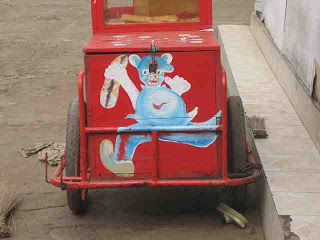


Bill and I met up with volunteer Jerry (posted in the nearby town of Tiko). On the way to the beach we also enjoyed a little Mutango (Palm Wine) at a shack near the beach in Batoké.
 Palm wine (Mutango) is a popular drink in Cameroon, especially in rural areas. It's the sap from palm trees, usually going straight from the tree to your glass. No refining or processing is necessary, although sometimes classier joints will strain out the bugs that can get into it from the trees. The sap begins to ferment the instant it comes out of the tree and within as little as two hours can be up to 4% alcohol. It gets progressively stronger the longer it ferments and needs to be consumed soon after taking it out of the tree. After 48 hours it pretty much turns to vinegar, although refrigeration can extend its life.
Palm wine (Mutango) is a popular drink in Cameroon, especially in rural areas. It's the sap from palm trees, usually going straight from the tree to your glass. No refining or processing is necessary, although sometimes classier joints will strain out the bugs that can get into it from the trees. The sap begins to ferment the instant it comes out of the tree and within as little as two hours can be up to 4% alcohol. It gets progressively stronger the longer it ferments and needs to be consumed soon after taking it out of the tree. After 48 hours it pretty much turns to vinegar, although refrigeration can extend its life. Drink it relatively soon after it comes out of the tree and it is still pretty mild and sweet tasting. It has a unique flavor that varies depending on the type of palm tree, region, soil, etc. I've had two kinds in Cameroon so far: one in Ekekom that tasted a little like peanuts and the one in Batoké, which vaguely reminded me of the Martinelli's faux champagne apple cider that people who don't want alcohol drink on New Year's Eve. The peanutty stuff was OK, but the mutango we had in Batoké was delicious. Cheap too - a 1.5 liter bottle ran 150 Francs CFA (about $0.30 US). Bill has lots more detail here.
The lady who ran the mutango shack insisted we accept her gift of some local mystery fruit that none of us could identify. Not particularly good. A little bitter. Jerry threw it into the Limbé river after we tasted it.

We all spent a night at a hotel in Limbé located in a bird sanctuary along the Limbé river. Great view of the ocean too.

 While having breakfast at the hotel Bill made a new friend.
While having breakfast at the hotel Bill made a new friend.
We spent two days at a quiet little beach in the village of Batoké. On the way to the beach we passed lots of small children waving at us and excitedly shouting "White man! White man!" Little kids in Cameroon tend to get very excited when they see a white person. It was kind of cute actually.

The water was warm and calm and our time at the beach was nice and relaxing. I enjoyed floating on my back and looking back towards the mountains rising up beyond the shore.
Since the rocks pounded by the surf into sand were volcanic in origin, the sand on the beaches in the area is black, which I thought was pretty cool. Only problem is that when the sun is out it gets HOT. You have to run for the water to keep your feet from burning off.






Limbé is also the heart of Cameroon's oil industry and there is a big facility owned by SONARA (the Cameroonian national oil company) and some offshore drilling platforms in the area. I'm told that pollution from the oil industry can sometimes foul the beaches and makes Kribi a more popular destination. Fortunately there were no spills while we were there.




1 comment:
I reached your blog by researching palm wine. I read about it in the book Things Fall Apart by Chinua Achebe, which is required reading in our high school. I am a retired biology teacher and wanted to understand what our students are reading. Palm wine is mentioned often. Thanks for your description of its production as well as your photos. I was not expecting to see a whitish liquid. Congratulations on choosing to work with the Peace Corps. Your experiences will enrich your life and the lives of others.
Post a Comment